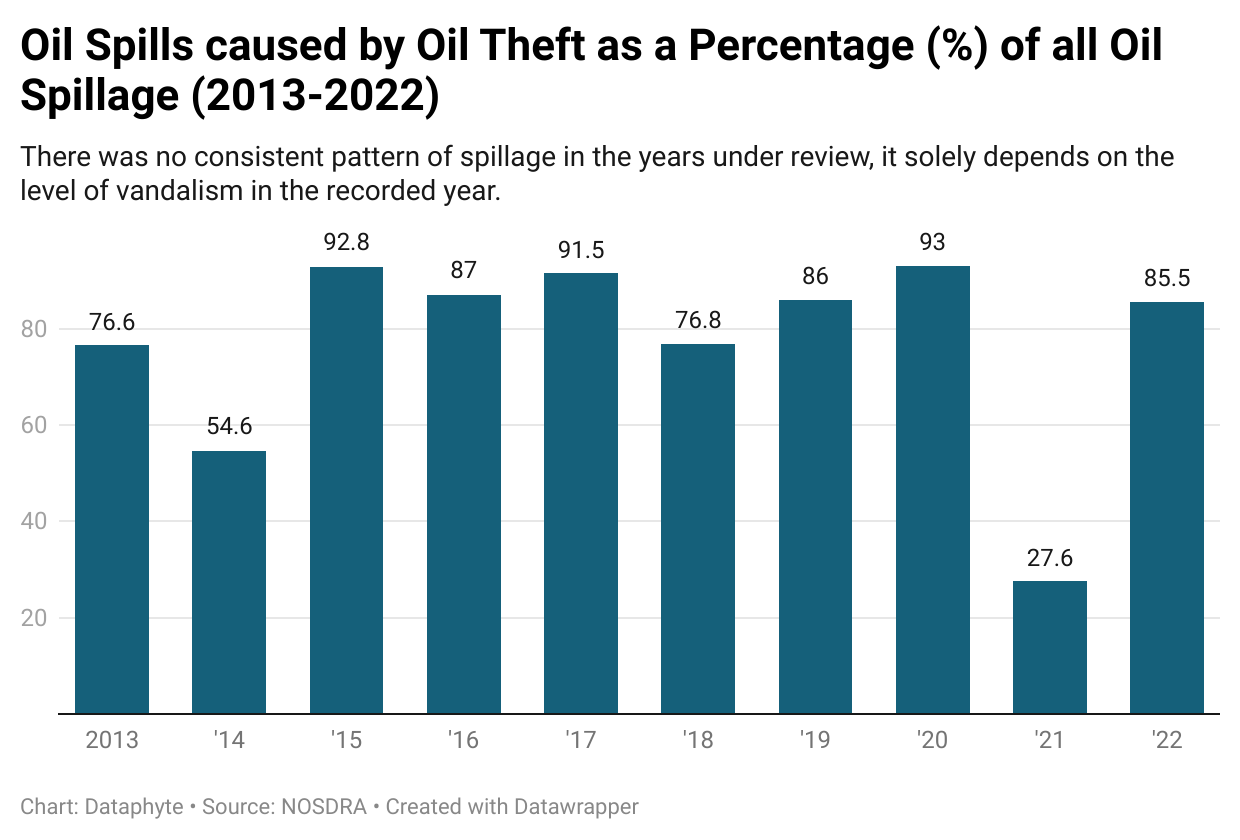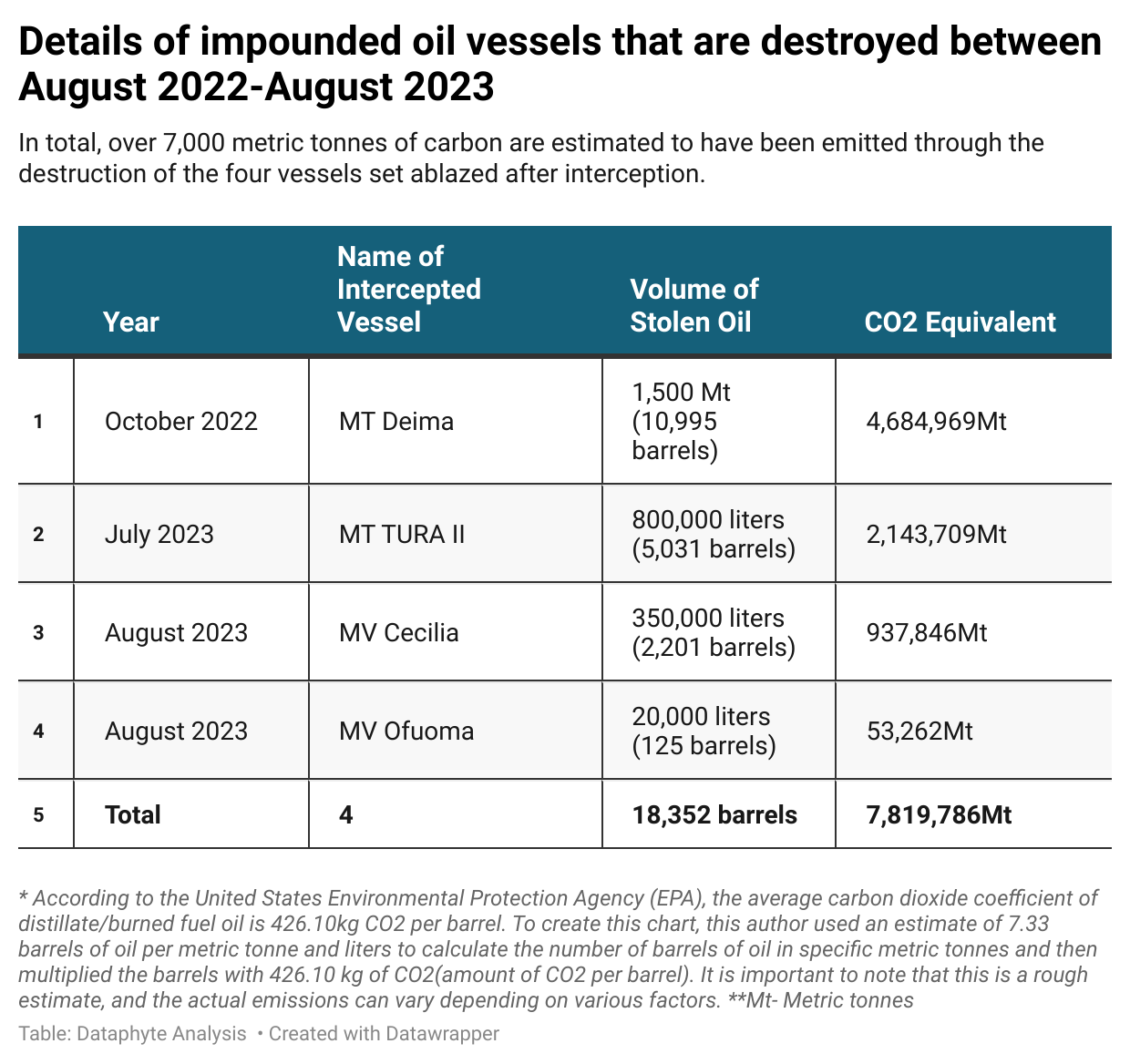Four oil vessels, suspected to be laden with proceeds of stolen crude oil, were intercepted between October 2022 and August 2023 by the Nigeria Navy, the Tantitta Security Services Limited, and personnel of the Joint Task Force of Operation Delta Safe.
The four vessels were all blown off hours after their detection.
While this has become a norm, the bombing approach is unpopular among the citizens and has sparked concerns about environmental pollution.
Environmentalists warn that the government needs to find a sustainable way of handling looted oil rather than outright burning, due to the grave risks that burning oil boats together with the oil contents pose to the environment and human health.
When asked about the legality of the act of destroying the impounded stolen oil vessel, the Director of Operations and Technical Unit at Tantitta Security, Captain Warredi Enisuoh stated that apart from the rule of engagement that dictated their action, the delay of court processes that may take up to 10 years before the final verdict and the likelihood of leakages in the ship into the waters are reasons for their approach.
He claimed that such spillage could cause more harm to the ecosystem than immediate destruction. Additionally, he cited chances of manipulation during evacuation as another reason it is better to destroy ships immediately after capture. After all, it is a global practice and less dangerous when compared with other options, he said.
Despite these excuses, the act has elicited reactions from environmental experts, civil society organizations (CSOs), and other stakeholders, who faulted the approach and called for its revision.
Some commentators went as far as saying that the approach is a stratagem by the government to cover up for actors in the illicit business and prevent them from retribution. Certain pundits expressed their belief in the ability of the government to effectively end oil theft in a week provided the appropriate political will is applied.
Another dimension to the reactions from citizens is the environmental damage the burning and possible spillage could cause to the ecosystem. Concerns were that the oil inside the vessel could just have been evacuated before the eventual destruction rather than risking the safety of the people and the ecosystem, adding to the existing environmental disaster in the region caused by lingering oil spillage which totaled 16,135 barrels in 2022.

The disastrous consequences of the act are so much that a single drop of crude oil can contaminate 25 liters of water, the Health of Mother Earth Foundation, noted.
What does the law say?
In August 2022, when a similar verdict was passed on an intercepted oil vessel suspected to be carrying illegal crude by the then Chief of Defense Staff, General Lucky Irabor, the leader of Tantitta Security Service, Government Ekpemuplo publicly defended the method by citing a section of the Nigeria Hydrocarbon Oils Refineries Act.
As cited, section 15 of the Act stated that:
“If any officer has reasonable grounds to suspect that any refining of hydrocarbon oils contrary to the provisions of this Act is being carried out on any land or premises, he may enter thereon, if need be by force, and dismantle or seize any apparatus and equipment used for or in connection with such unlawful refining.”
He asserted that since the purpose of the illegal exploration is to refine, this section of the Act is applicable.
However, while this section of the law states that any apparatus and equipment used for the illegal act be seized or dismantled, it does not necessarily include that the content, that is, the hydrocarbon oils, be destroyed together with the apparatus and equipment. This suggests that the legal grounds for the military approach is shaky.
Renowned Lawyer and Rights Activist, Femi Falana, informed that: “There is no provision in the rules of engagement that authorises military personnel or security operatives to set fire to or destroy vessels loaded with stolen crude,” the Gusardian reported.
He opined that the whole exercise is “a deliberate attempt to cover up the involvement of military personnel in the serious crime of oil theft.”
What are the Environmental Consequences of Burning Oil Vessels Together with the Crude Oil in it?
Crude oil is one of the fossil fuels and is a major source of energy. It consists of volatile organic compounds (VOCs) and polycyclic aromatic hydrocarbons (PAHs). Inhaling these chemical constituents can be highly toxic and may be associated with cancer development.
The release of oil into the environment poses a significant threat to human health due to the harmful and toxic nature of its chemical components. When burned, fossil fuel releases greenhouse gases (carbon, methane, and nitrous oxide) into the atmosphere.
In what is referred to as the greenhouse effect, the gases trap heat in the atmosphere and cause global warming. The lifecycle and global warming potentials of these gasses vary and can lead to varying toxic effects.
-1707921633.png)
A study by the National Library of Medicine delved into the consequences of oil exposure on communities residing near oil exploration areas. It submitted that in the case of animals, the impact of exposure to crude oil on their immune systems varies depending on the intensity of the contact which sometimes increases their susceptibility to infectious diseases.
A rough estimate of the carbon emissions that could have been released through the burning of the four oil vessels is put at 7,819 metric tonnes of carbon which is capable of causing extreme damage to the environment and the people.

At a time when the world is aggressively working to reduce carbon emissions, mitigate the effects of climate change, and end environmental hazards, it is disastrous to engage in acts that could undermine world efforts toward a sustainable ecosystem that is safe for all.
A review and research-driven modification to laws and legislations guiding oil exploration, associated offenses and penalties is necessary for formulating policy that is eco-friendly and that reduces environmental hazards. This way, we can effectively tackle oil theft without damage to the environment.
Economic Concerns of Oil Theft
Beside the environmental concerns, oil theft remains a big challenge to Nigeria’s oil industry with little or no success at eliminating it. A Dataphyte report revealed that Nigeria lost over 619.7 million barrels of oil valued at $46.16 billion to various forms of theft between 2007 and 2020.
The stolen amount translates to N35.51 trillion, at N769.24/dollar as of Aug 10, 2023, one that could have been expended on important developmental projects for public good.
Nigeria loses 400,000 barrels of crude oil daily. The figure is quite high when compared to other top oil-producing countries like Mexico, Iraq, Russia, and Indonesia that are experiencing the same crisis.
A report by Oilprice.com in 2014 showed that Nigeria leads the list of countries that are most plagued by oil theft in the world, nine years later, the reality remains the same.
There is no specific figure for Iraq and Russia. However, Mexico loses between 5,000-10,000 barrels of crude oil daily and Indonesia loses 2,000-3,000 barrels per day.
Oil and Gas expert, Ademola H. Adigun in an exclusive interview with Arise News said Nigeria’s struggle with oil theft is more of a systemic problem that requires a deep and robust institutional reform to tackle




-1707921633.png)
